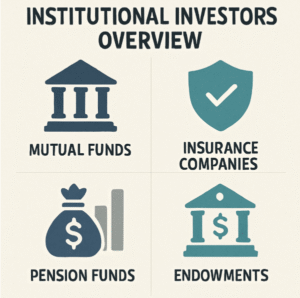Institutional investors are entities that pool money to purchase securities, real estate, and other investment assets. These entities include some of the most powerful players in the financial markets, such as pension funds, insurance companies, mutual funds, and hedge funds. Unlike individual retail investors, institutional investors manage large sums of money, which allows them to access a wider range of investment opportunities and negotiate more favorable terms. Their size and influence enable them to impact market trends and contribute to the liquidity and stability of financial systems. They are often seen as key drivers of innovation and efficiency in capital markets due to their ability to allocate resources on a large scale.
Types of Institutional Investors
- Pension Funds: These are investment pools that pay for workers’ retirements. Pension funds are significant players in financial markets due to their long-term investment horizons and the substantial capital they manage. Their investment strategies often focus on generating stable, consistent returns to meet future liabilities, influencing both equity and fixed-income markets significantly.
- Insurance Companies: They invest premiums collected from policyholders to generate returns that can cover future claims. Insurance companies are typically conservative in their investment strategies, focusing on stable, long-term assets. Their need to match assets with liabilities makes them significant holders of government and corporate bonds, contributing to the stability of these markets.
- Mutual Funds: These funds pool capital from multiple investors to purchase a diversified portfolio of stocks, bonds, or other securities. Mutual funds offer investors an opportunity to diversify risk without needing to manage individual investments. By offering a variety of fund types tailored to different investor goals, mutual funds play a crucial role in providing liquidity and efficiency to the financial markets.
- Hedge Funds: Known for their aggressive investment strategies, hedge funds use leverage and derivatives to achieve high returns. They often invest in a wide range of assets, including stocks, bonds, commodities, and currencies. Their flexibility and pursuit of absolute returns allow them to capitalize on market inefficiencies, though they can also contribute to market volatility.
- Sovereign Wealth Funds: Owned by governments, these funds invest in a variety of asset classes, including stocks, bonds, real estate, and private equity. Sovereign wealth funds help manage national savings and stabilize economies. With their long-term focus, these funds can influence global market trends and are increasingly active in areas like infrastructure and technology investments.

Advantages of Institutional Investors
- Access to Diverse Investment Opportunities: Institutional investors can invest in private equity, hedge funds, and other alternative investments that are often out of reach for retail investors. This access allows them to diversify their portfolios more effectively, spreading risk across a wider array of asset classes and geographies.
- Lower Costs: Due to their large transaction volumes, institutional investors pay lower fees and commissions. This cost advantage can significantly enhance net returns, allowing them to reinvest savings into further opportunities and maintain a competitive edge in the market.
- Professional Management: With teams of professional analysts, institutional investors can make more informed decisions and better manage risks. These teams can respond swiftly to market changes and leverage advanced technologies and analytics to optimize investment strategies, ensuring that portfolios align with both short-term opportunities and long-term goals.
Impact on Markets and Corporate Governance
Institutional investors significantly influence asset prices and market trends due to the large volumes of trades they execute. Their buying and selling activities can impact market liquidity and volatility, often setting the tone for broader market movements. Moreover, institutional investors play a crucial role in corporate governance by actively engaging with companies to influence management decisions and advocate for shareholder interests, thereby promoting transparency and accountability.
Market Stability
Institutional investors contribute to market stability by providing liquidity and mitigating price volatility. Their presence ensures that there is a steady flow of capital, which can prevent dramatic swings in asset prices. Their long-term investment horizons enable them to act as stabilizing forces in turbulent markets, as they are less likely to engage in panic selling during downturns. This stability is crucial for maintaining investor confidence and facilitating the smooth functioning of financial markets.
Corporate Influence
Institutional investors often hold substantial stakes in public companies, giving them considerable influence over corporate governance. They engage in shareholder activism by voting on key issues, such as executive compensation and board appointments, and can push for changes that enhance shareholder value. Their involvement can drive companies towards more sustainable practices and improved performance, aligning business strategies with the interests of all stakeholders.
Regulatory Environment and Challenges

Institutional investors operate within a complex regulatory environment that varies across regions. These regulations are designed to ensure market integrity, protect investors, and maintain financial stability. Regulatory shifts can impact their investment strategies and risk management practices. For instance, changes in capital requirements or tax regulations can influence how institutional investors allocate their assets, affecting their ability to generate returns.
Navigating Regulatory Changes
Institutional investors must stay informed about evolving regulations to adapt their strategies accordingly. This requires continuous monitoring of legal and regulatory developments, as well as collaboration with legal and compliance experts to ensure adherence to the law. By staying proactive in their approach to regulatory changes, institutional investors can mitigate risks and capitalize on opportunities presented by new policies.
Challenges and Opportunities
While institutional investors face challenges such as regulatory compliance and market volatility, they also have opportunities to capitalize on emerging trends. The growing focus on environmental, social, and governance (ESG) criteria presents new investment opportunities in sustainable assets. By integrating ESG considerations into their investment processes, institutional investors can align their portfolios with societal values and attract a broader base of investors who prioritize sustainability.
Conclusion
Institutional investors are key players in the global financial ecosystem, driving market dynamics and influencing corporate governance. Their ability to manage large sums of money and access diverse investment opportunities gives them a unique advantage over retail investors. However, they must navigate complex regulatory environments and adapt to changing market conditions to succeed. As the financial landscape continues to evolve, the role of institutional investors will likely expand, encompassing new asset classes and technologies.
For institutional investors, corporate finance professionals, and startup entrepreneurs, understanding the role of institutional investors and the dynamics of global capital markets is essential for making informed decisions and achieving financial success. By leveraging the insights and strategies discussed in this article, stakeholders can better navigate the complexities of the financial landscape and capitalize on emerging opportunities. This knowledge not only aids in strategic planning but also enhances the ability to anticipate market shifts and respond effectively.

